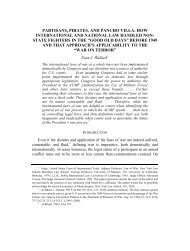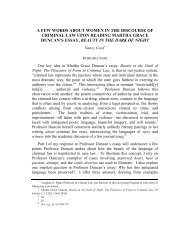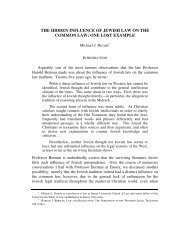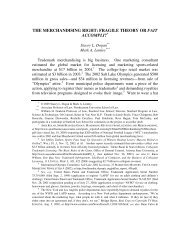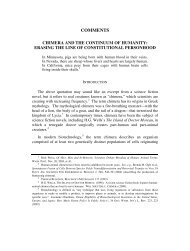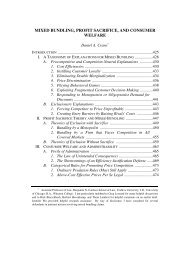life, liberty, and the pursuit of swords and armor - Emory University ...
life, liberty, and the pursuit of swords and armor - Emory University ...
life, liberty, and the pursuit of swords and armor - Emory University ...
You also want an ePaper? Increase the reach of your titles
YUMPU automatically turns print PDFs into web optimized ePapers that Google loves.
1316 EMORY LAW JOURNAL [Vol. 57<br />
do not possess that same good. 113 If one person uses or enjoys a virtual good,<br />
o<strong>the</strong>r players cannot use or enjoy it simultaneously. A person can certainly<br />
transfer virtual goods to o<strong>the</strong>r players. Finally, a person can exclude o<strong>the</strong>rs<br />
from using her virtual goods.<br />
Virtual property also resembles chattels more closely than intellectual<br />
property on <strong>the</strong> dimensions <strong>of</strong> persistence <strong>and</strong> interconnectivity. Like personal<br />
property, virtual goods in MMORPGs are persistent—that is, <strong>the</strong>y “do[] not<br />
fade after each use, <strong>and</strong> [<strong>the</strong>y] do[] not run on one single computer.” 114 And<br />
like chattels, virtual goods in MMORPGs are interconnected, “although one<br />
person may control [<strong>the</strong>m], o<strong>the</strong>rs may experience [<strong>the</strong>m].” 115<br />
Given that virtual goods “share every relevant attribute <strong>of</strong> physical<br />
property, [although] <strong>the</strong>y are not really physical,” 116 it is unclear why scholars<br />
insist on characterizing virtual goods as intellectual property on <strong>the</strong> basis <strong>of</strong><br />
mere intangibility. Instead, “<strong>the</strong> same framework that adjudicates <strong>the</strong> rights <strong>of</strong><br />
those who want to sell used books, used cars, <strong>and</strong> used compact discs, [should<br />
be] used [for] digital <strong>swords</strong>.” 117<br />
2. Only <strong>the</strong> Property Rights Inherent to Chattels Can Protect Virtual Goods<br />
from Theft<br />
Why is it important to classify virtual goods as personal property as<br />
opposed to intellectual property? Intellectual property, specifically copyright<br />
as it would apply to virtual goods, only protects <strong>the</strong> author’s expression <strong>of</strong> his<br />
ideas, because it grants <strong>the</strong> author specific rights in his expression. 118 The right<br />
113 The ability to replicate virtual goods in MMORPGs does not diminish <strong>the</strong>ir possessive quality. Copies<br />
<strong>of</strong> virtual goods are available in MMORPGs. For example, two or more people can own <strong>the</strong> “Fungus Covered<br />
Scale Tunic” at any point in time in EverQuest. Yet, in real <strong>life</strong>, two or more people can also own a Ralph<br />
Lauren shirt. The ability to replicate <strong>the</strong> Ralph Lauren shirt does not diminish its possessive characteristic.<br />
114 Fairfield, supra note 70, at 1054.<br />
115 Id.; see also Charles Blazer, Note, The Five Indicia <strong>of</strong> Virtual Property, 5 PIERCE L. REV. 137, 141<br />
(2006) (“[T]he presence <strong>of</strong> secondary markets <strong>and</strong> value-added-by-users may serve as additional indicia <strong>of</strong> a<br />
virtual property interest worthy <strong>of</strong> legal protection.”).<br />
116 Schwarz, supra note 109, at 24.<br />
117 Id. But see Erez Reuveni, On Virtual Worlds: Copyright <strong>and</strong> Contract Law at <strong>the</strong> Dawn <strong>of</strong> <strong>the</strong> Virtual<br />
Age, 82 IND. L.J. 261, 261 (2007) (arguing “that copyright law can <strong>and</strong> should apply to artistic <strong>and</strong> literary<br />
creations occurring entirely in virtual worlds”); W. Joss Nichols, Painting Through Pixels: The Case for a<br />
Copyright in Videogame Play, 30 COLUM. J.L. & ARTS 101, 130 (2007) (arguing that video game play<br />
warrants copyright protection).<br />
118 See Susan A. Dunn, Defining <strong>the</strong> Scope <strong>of</strong> Copyright Protection for Computer S<strong>of</strong>tware, 38 STAN. L.<br />
REV. 497, 518 (1986).




